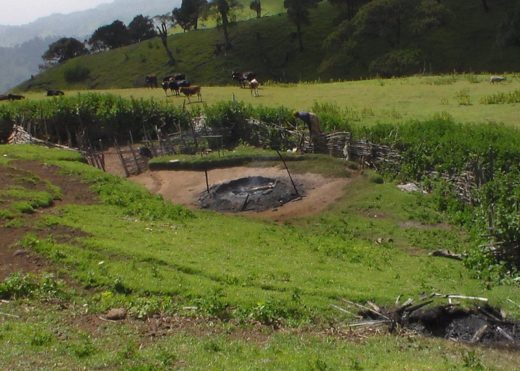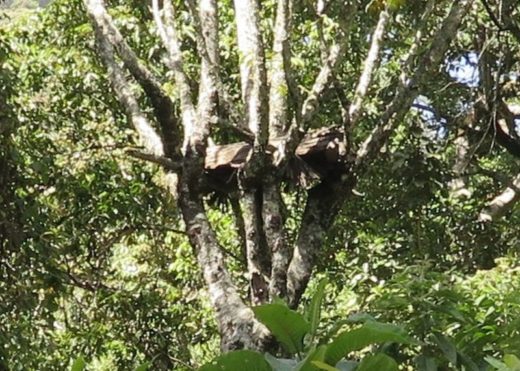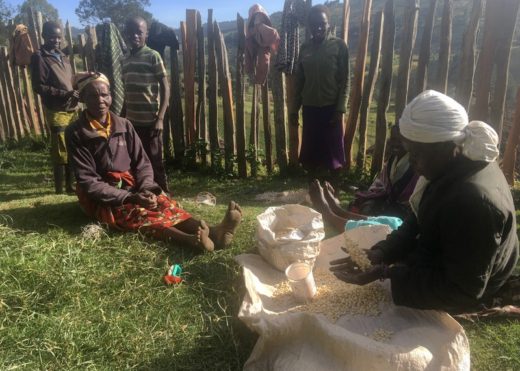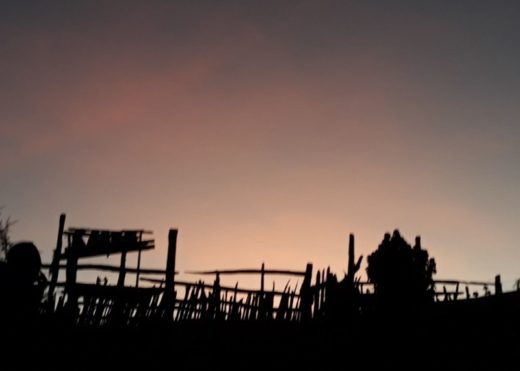The Sengwer say they have lived in Embobut forest since at least the 19th Century. They are defending their human rights, and their demands are clear: the government must recognize their land rights and work with them to protect the forest.
The Kenya Forest Service (KFS), under the Ministry of Environment and Forestry, is forcibly evicting the Sengwer Indigenous people from Embobut forest to make way for a conservation project. The authorities accuse the Sengwer of damaging the forest, but the government has no evidence of this. They are burning the homes of the Sengwer, and violence and intimidation against community members.
They told me not to scream or they would kill me.
David is a 35-years-old Sengwer man who was shot during a forced eviction.

Home no longer safe
“They came down to the river and attacked us from behind. (…) I was shot on my left leg around the knee and fell down”, said David, a 28 years old Sengwer man. On 16 January, the Kenya Forest Service guards (KFS) who are tasked by the government to manage the forest allegedly shot and killed Robert, a Sengwer man and seriously injured David.
The forced evictions violate the Sengwer’s human rights. The government continues to disregard both the international law and its own constitution regarding the rights of Indigenous People. As a result the Sengwer cannot live in their homes.
We must support Sengwer people in their fight for their ancestral land. The Kenyan government must immediately stop the forced evictions of the Sengwer and let them live in their home, in Embobut.


Human lives at risk, suspension of the project
According to the government, the community agreed to leave Embobut forest, but in reality, they were given no other option. A mass eviction was carried out. Community representatives went to court to protest the eviction, an injunction order was issued but this was ignored. A cash compensation programme set up only after the forced evictions and was hampered by corruption; many forest residents were not compensated.
I want the government to allow us back into the forest. That’s the place where I was born. Sengwer people are able to manage the forest, this should be done by us.
Anne, a Sengwer woman who has been forcibly evicted from her home in the Embobut forest
Since 2014, the Kenyan government has intensified the forced evictions of the Sengwer, on the grounds of protecting the environment. The Embobut forest has been a site for a number of conservation projects funded by international donors. Currently it is part of the Water Tower Protection and Climate Change Mitigation and Adaptation (WaTER) conservation project, which is funded by the European Union.
Due to the violence and the killing that occurred during the forced evictions, the EU announced on 17 January that it was suspending funding for the project. However, it is still not clear if and under which conditions the EU would agree to resume the project, and which guarantees they would offer the Sengwer people against further human rights violations.
After the suspension, the Kenyan government argued that the evictions are justified and would continue. Since 29 December 2017, it is reported that 341 of houses have been burnt by the KFS and 597 people have been made homeless.



Misguided conservation, devastating consequences
Sengwer children struggle at school and often drop out due to the difficult conditions they experience at home. “My children don’t have enough food and clothing. They have not been attending school for a while because I cannot pay the school fees. When they go they are treated badly by other kids because they have bad clothes and no shoes”, said Janine, a Sengwer woman.
Many Sengwer people did not get compensation during and after the evictions and as a result they now live in crushing poverty. Even for those who did, it was still largely insufficient and did not allow them to buy land that would support their livelihood. Often finding themselves homeless, they had to ask family or friends to accommodate them, in some cases families of up to 10 in one room.
I was forced to leave the forest and never got compensation. I stayed with someone I knew first and then moved into this house. I can be evicted anytime. I am worried about who will feed me and my family if I get evicted. Where will I live? The forest is not a good place right now because of the KFS
A Sengwer woman and head of a household of nine
This has caused a number of challenges for Sengwer women. Many are now the main or sole provider for their family as a lot of men either decided to remain in the forest or left their families after the evictions. The evictions have affected their financial autonomy: one woman told Amnesty she used to share work with her husband, looking after their animals and selling milk and honey to get money, but now she struggles to get work outside the forest and has to rely on male relatives to get an income.
The Sengwer people are resisting, and although some were forced out, many refuse to leave the forest. They have seen what life outside holds for them – often poverty and dislocation from their traditional livelihoods – and they are determined to fight for their rights. This means that they have to live in temporary and precarious shelters, constructed out of tree bark and plastic sheet, because they know that their homes will be destroyed if found by forest guards.
No accountability for violations
In April 2017, Elias, a Sengwer leader and human rights defender was badly injured by the KFS.
“I was taking pictures of KFS guards who were burning houses… I counted 29 burnt houses. The guards started shooting at me. I ran, but tripped and fell, breaking my kneecap, and they caught up with me. They hit me with the butt of a rifle, and broke my arm. They took two cameras and an iPad from me.”
Elias was in hospital for 16 days. To this date, no one has been held accountable for the attack. He has also been warned by his contacts in the intelligence services that he is under surveillance from the authorities, his phone is being tracked and the KFS wants to “eliminate” him.

